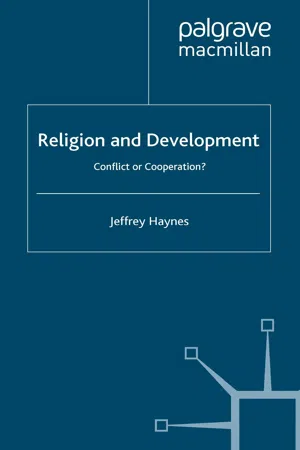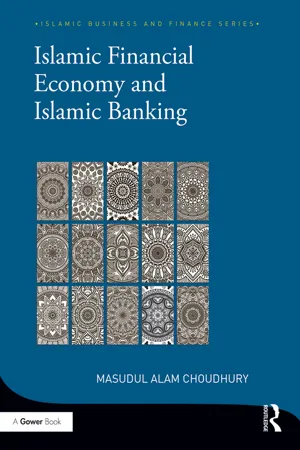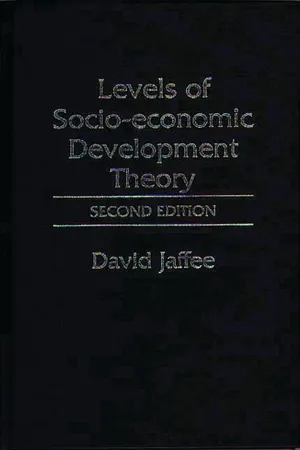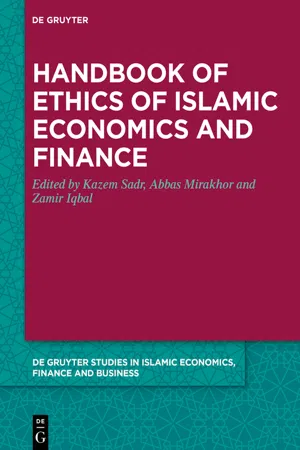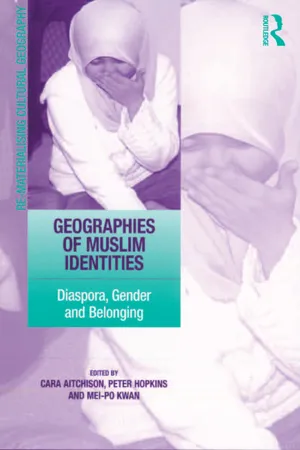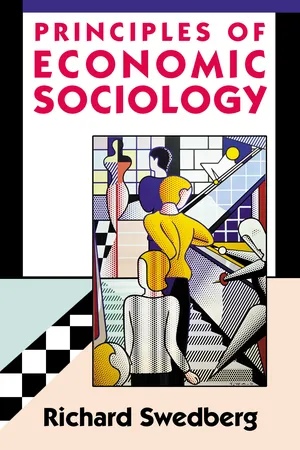Social Sciences
Economic Development and Religion
Economic development and religion explores the relationship between economic growth and religious beliefs and practices. It examines how religion can influence economic development through its impact on social norms, values, and behaviors. This field of study also investigates how economic development, in turn, can shape religious beliefs and practices within societies.
Written by Perlego with AI-assistance
Related key terms
1 of 5
7 Key excerpts on "Economic Development and Religion"
- eBook - PDF
Religion and Development
Conflict or Cooperation?
- J. Haynes(Author)
- 2007(Publication Date)
- Palgrave Macmillan(Publisher)
On the other hand, many aid practitioners and scholars now writing about development strate- gies concur that to try to exclude religion is likely to be counterproduc- tive. In short, as already noted, there is growing recognition of religion’s potential in achieving better development outcomes. As we shall note briefly below, before examining in following chapters at greater length in relation to achievement of the MDGs, many – perhaps most – development scholars and practitioners would now accept the need to see religion as an important dimension of develop- ment. This can extend to the notion that development – especially human development – is a partly religious or spiritual expression, the basis upon which many societies in the developing world develop, pri- marily through processes of self-renewal and growth while welcoming appropriate external material assistance. In short, there is wide agree- ment that religion is now a significant factor to be considered in any study or policy concerning social development (Wolters 2004). According to Jos van Gennip, director of the Dutch development cooperation organisation Cordaid and deputy director general for development cooperation in the Dutch Ministry of Foreign Affairs, development professionals need to focus their attention on ‘three levels: development at an individual, at a community and at a society level’ (Quoted in Wolters 2004: 1). Regarding disappointment at development achievements in the developing world, especially among the poor, van Gennip highlights what he sees as one of the major problems: ‘the empty space between the individual and the society. This empty space has become problematic in process of modernization and globalization. Religion can play an important role here’ (Quoted in Wolters 2004: 1). - eBook - ePub
- Masudul Alam Choudhury(Author)
- 2016(Publication Date)
- Routledge(Publisher)
Chapter 3Religion and Social Economics 1AbstractIntroductionA methodological study of religion including moral, ethical, social values, and economics takes us into the search, discovery, and establishment of a formal epistemological premise. Social economics is now studied as a methodological investigation of evolutionary and embedded systems integrating the moral, social, and economic systems. Thus, an integrated theory of religion representing the realm of moral and social values and economics is formalized. We write on the conjoint methodological perspective of the integrated domain of religion and economics. A formal ontology of the unified field of religion and economics is established in such an inter-causal and organically unified realm of moral, social, and economic values. A phenomenological model of the unified worldview that applies to a systemic concept of ‘everything’ emerges. This methodology and the immanent phenomenological model relating to it convey the principle of inter-systemic organic symbiosis by a unique and universal worldview. The systemic integration between religion and economics is formally studied within the immanent system-methodology that formalizes multidisciplinary symbiosis.For some time now, papers published in social economics have enriched a spectrum of intellectual diversity in heterodox economic thought. The history of economic thought including in it the social and moral elements of eminent contributions is a candidate in this intellectual diversity (ex. Doeringer, 1985). Other fields comprised social areas of economics, such as education, health, and philanthropy. There were also significant contributions on the development of catholicity in human wellbeing (McKee, 1992; especial issues of RSE, 1991). Other papers have examined methodological questions on new horizons of thought in economic theorizing, which have spanned the model of the embedding of economic and social disciplines (Etzioni, 1987). The field of inquiry in social economics has not ceased to expand in such diversity of scope. - eBook - PDF
- David Jaffee(Author)
- 1998(Publication Date)
- Praeger(Publisher)
Sociological studies have emphasized the traditional-to-modern transition as part of the larger process of social change. Economists, on the other hand, tend to view development in terms of economic growth. Each of these perspectives has shaped the contemporary definition of socio-economic development. The Concept of Social Change In sociology, the terms social change and development are frequently used interchangeably. A closer examination of the development literature, however, indicates that the two terms differ in their level of generality. Social change is usually regarded as a constant, ongoing process affecting many areas of life, whereas development is used to denote more specific, empirically measurable, forms of change. According to Kornblum (1988:566), social change refers to "variations over time in the ecological ordering of populations and communities, in patterns of roles and social interactions, in the structure and functioning of institutions, and in the cultures of societies." Social change, as this definition implies, is a broad, multidimensional process affecting numerous aspects of social life. It operates at a variety of socio-economic levels. At the individual level there are the changes in cultural beliefs and attitudes; at the organizational level there are changes in roles and patterns of interaction; at the societal level there are changes in the functioning of major institutions and the demographic processes of rural- to-urban migration. The classical study of social change has been dominated by the assumption 4 Levels of Socio-economic Development Theory that each of these patterns of change—ecological, cultural, interactional, and institutional—is an inevitable subcomponent of a broader logic moving societies from the traditional to the modern form. - eBook - PDF
- Rhona C. Free(Author)
- 2010(Publication Date)
- SAGE Publications, Inc(Publisher)
76 ECONOMICS AND RELIGION CARMEL U. CHISWICK University of Illinois at Chicago T he last two decades of the twentieth century saw an explosion of empirical as well as theoretical research into the relationship between religion and economic behavior. For the most part, this research ignores theological differences, focusing instead on behavioral dif-ferences associated with different religious identities. The causation runs both ways: Some studies analyze the effects of religious identity on various economic activities, and others analyze the effects of economic incentives on reli-gious observances and institutions. Both of these lines of research have yielded strong results and have dramatically affected our understanding of the relationship between economics and religion. Prices and incomes are powerful incentives that invariably influence the actions of individu-als, and the human capacity for creative rationalization contributes to the widespread evasion of costly behaviors, including costly religious strictures. Before economics became a modern social science, casual observation generated many stereotypes about dif-ferences between religious groups regarding economic success, differences that were often attributed to differ-ences in religious teachings. Today these arguments are viewed with skepticism. Some are based on stereotypes that do not stand up to empirical scrutiny. Others are based on an imperfect understanding of the religious teachings to which they refer. Recent research suggests that some of the most important differences between religious groups can be explained not directly, by the religious strictures them-selves, but indirectly by intervening variables that affect the economic incentives faced by individuals. To provide an overview of this subject, this chapter begins with a consideration of the economic incentives affecting a consumer's decisions in the religious market-place—that is to say, the demand for religion. - Abbas Mirakhor, Zamir Iqbal, Seyed Kazem Sadr, Abbas Mirakhor, Zamir Iqbal, Seyed Kazem Sadr(Authors)
- 2020(Publication Date)
- De Gruyter Oldenbourg(Publisher)
Mirakhor and Askari (2010) studied the evolution of the concept of economic development in the West from the beginning until now and considered this concept from the viewpoint of the Qur’an in their book titled Islam and the Path to Human and Economic Development . They conclude: “Islam’s concept of development con-tains three interrelated dimensions of self-development, physical-material develop-ment, and societal development. The Creator has provided for humans the ways and means of achieving all the dimensions fully and comprehensively. The most crucial and central to Islam’s concept of development is the progress humans make in devel-oping the self. Without this, balanced and appropriate progress in the other two dimensions of development is not possible; any forward movement in them without self-development leads to harmful distortions. Compliance with the rules prescribed by the Law Giver prevents distortions. The rules constitute a network that regulates all dimensions of the human experience, individually and collectively, on this plane of existence. Rule-compliance promotes material growth through higher total factor Chapter 7: Relationship Between Ethics and Economic Development 133 productivity (TFP).” This paper shares this conclusion. However, its focus is on the physical-material dimension of economic development and attempts to discover the interrelationship of this dimension with Islamic ethics from the viewpoint of the Qur’an and Hadith. Study of the Qur’an and Hadith of Ahl Al-Bayt (as1) reveals that development of material means of life can be investigated through two different systems of thought and approach. One is founded on materialism and “Takathur” (literally, it means proliferation) which means to economic development based on accumulation of wealth by a few) and is therefore called “ Takathuri model” of development. The other is development on the basis of monotheism and divine ethics.- eBook - ePub
Geographies of Muslim Identities
Diaspora, Gender and Belonging
- Peter Hopkins, Cara Aitchison(Authors)
- 2016(Publication Date)
- Routledge(Publisher)
On the other hand, developments in broader Nigerian society during the colonial period tended to give security to the emirs of Northern Nigeria. Not only were they protected by the British, but the British also convinced them that they were a superior race with a more advanced civilization than that of Southern Nigeria (Lugard, 1929). Some of the emirs became as powerful as the British residents, such that the British resident could not accomplish anything without their cooperation. The native authority system was considered most successful in Northern Nigeria with its success due to the pre-existing structure of government established after the Islamic Jihad of 1804. Furthermore, even the colonial office in London was protective of Northern Nigerian emirates. Thus the emirs of Northern Nigeria felt very secure and saw no need to change. Indeed, they expected other Nigerian people to continuously accommodate to their ways. Consequently, they did not see any reason or need to critically re-examine their social structure and religious theology in terms of its relevance to contemporary and future challenges. By shielding themselves from the agents and forces of social change, they appeared to believe that things would remain the same indefinitely.Northern Nigerian Muslims did not begin to seriously realize their ‘relative lag’ in modern development until the 1950s when, because of social and political developments after the Second World War, the liquidation of colonial empires became inevitable. But, while Southern Nigeria was relatively prepared for this due to the social changes they had accepted (or that were forced on them) much earlier under colonial rule, Northern Nigeria had to start almost afresh in the 1950s in order to prepare herself institutionally for a modern democratic government and to grasp the processes of the emerging new social order.Religion and Economic Development
My main concern in this section is to document how religious values, beliefs, ethics, and behaviour contribute in facilitating economic entrepreneurship, economic development, social change and political stability. On the other hand, religion may promote political instability, maintain the status quo, and even slow down the process of economic development. Religion fits into this discussion in two broad ways: first, in how state elites use it to promote social change, particularly economic development, thereby legitimizing their regimes and, secondly, in how social groups in civil society can use religion to shape voting behavior, outcomes of political party contests, and the kind of public policies that elected state officials are able to formulate and implement. In the remainder of this chapter I focus only on the first part of this discussion. - eBook - PDF
- Richard Swedberg(Author)
- 2009(Publication Date)
- Princeton University Press(Publisher)
IX Culture and Economic Development For a full understanding of economic phenomena, it is not only nec-essary to pay attention to their political and legal dimension, but also to the role that is played by culture. In the classical studies in eco-nomic sociology this was done as a matter of course, which helps to account for their greatness. During most of the twentieth century, however, analyses in economic sociology have been less successful in this respect. As a result, rescue operations of the type “bringing x back in” have had to be carried out at regular intervals. One way to avoid this in the future would be to insist that any analysis in eco-nomic sociology routinely take political, legal, and cultural issues into account. This chapter will begin with a section on the concept of culture, in early sociology as well as in contemporary sociology. The main sec-tion, however, is devoted to the theme of culture and economic de-velopment. A series of works that draw on the notion of economic culture—from Tocqueville and onward—will be presented and com-mented upon. The discussion of the relationship between culture and the economy continues in the next chapter, where the emphasis is on contributions in contemporary economic sociology. The Concept of Culture and the Economy Sociologists have used the concept of culture in a number of ways, including its everyday meaning as high culture. From an analytical viewpoint, however, the most common approach (following Weber) has been to see culture as involving values . From this perspective, a sociological analysis should always try to outline which values a cer-tain social structure embodies (e.g., Lipset 1993; Harrison and Hunt-ington 2000).
Index pages curate the most relevant extracts from our library of academic textbooks. They’ve been created using an in-house natural language model (NLM), each adding context and meaning to key research topics.
